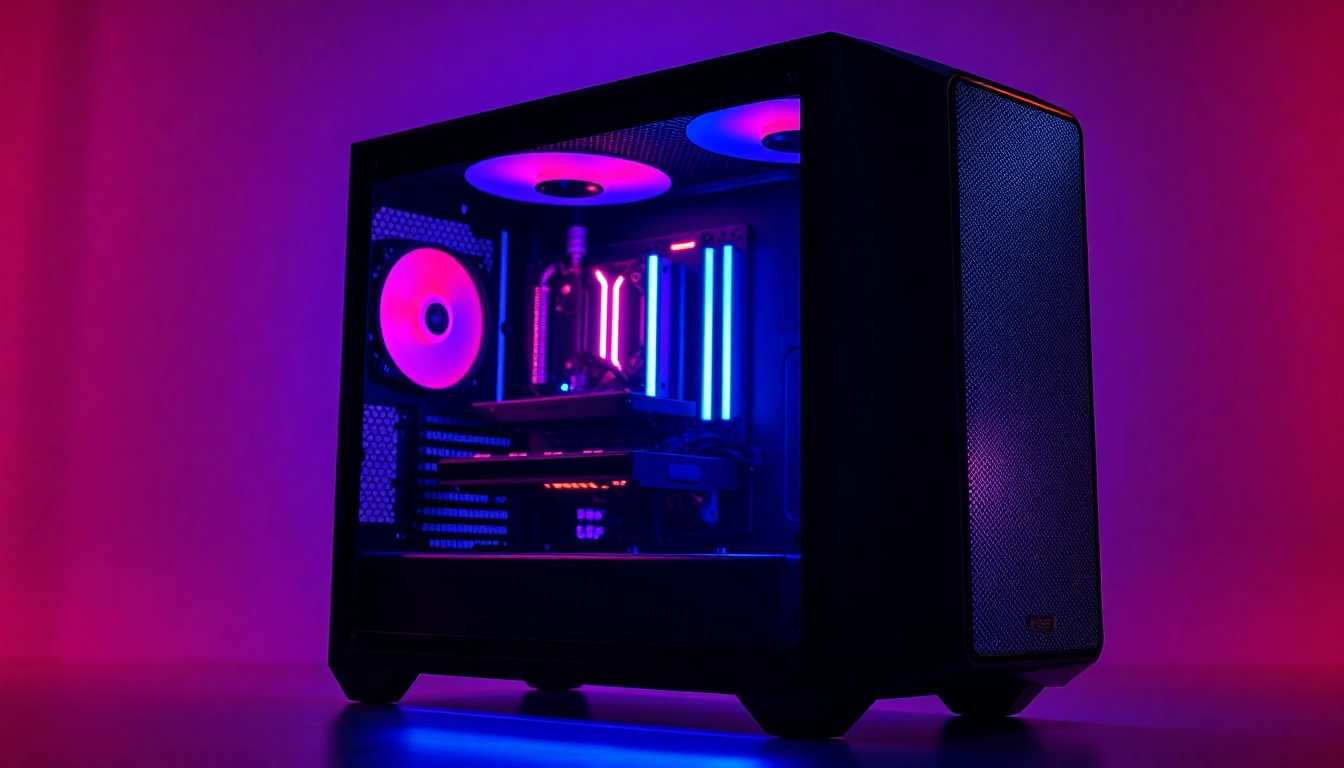Understanding Gaming PC Cases
What is a Gaming PC Case?
A gaming pc case is the enclosed structure that houses and protects the various components of a personal computer. Unlike standard cases, gaming PC cases are specifically designed to accommodate high-performance hardware often required in gaming. This includes powerful graphics cards, cooling systems, and dedicated power supplies, all of which generate a considerable amount of heat and require optimized configurations for airflow and cooling.
Common Types of Gaming PC Cases
Gaming PC cases come in various formats, each catering to different preferences and builds. Here are the most common types:
- Mid-Tower Cases: These are the most popular options, offering a balance between size and expandability. Mid-tower cases can support multiple GPUs and cooling systems while remaining compact enough for standard desks.
- Full-Tower Cases: Ideal for enthusiasts and custom builders, full-tower cases provide extra space for advanced cooling solutions and numerous components. This allows for extensive customization and future upgrades.
- Mini ITX Cases: These compact cases are designed for small form factor builds. They are ideal for users who need portability or usually have limited desktop space but still want a capable gaming rig.
- Cube Cases: Offering a unique aesthetic, cube cases provide a compromise between size and modular component availability. They often have a distinctive look and allow for unconventional internal arrangements.
Key Features to Look For in a Gaming PC Case
When selecting the right gaming PC case, several key features should be considered:
- Airflow: Good airflow is essential for cooling. Look for cases with ample fan support and ventilation options to dissipate heat effectively.
- Compatibility: Ensure the case can accommodate your chosen motherboard size, GPU length, and cooling component specifications.
- Expandability: Future-proof your build by considering how many additional drives or fans you might want to add later.
- Build Quality: Solid construction materials ensure durability. Look for cases made of steel, aluminum, or tempered glass for a stylish finish.
- Noise Reduction: Sound-dampening features can be invaluable for creating a quiet gaming environment.
- Aesthetics: The design and lighting options, including RGB features, allow customization to suit personal style preferences.
Top Gaming PC Case Brands in 2025
Leading Brands to Consider
The gaming PC market offers several renowned brands known for their high-quality cases. Some of the leading options in 2025 include:
- Corsair: Widely regarded for its stylish designs and exceptional airflow properties, Corsair offers a range of cases that fit various budgets.
- NZXT: Known for their minimalist design and robust cooling options, NZXT cases often feature a sleek aesthetic that appeals to gamers.
- Thermaltake: Focused on high-performance and innovative designs, Thermaltake cases typically include features like tempered glass panels and customizable RGB lighting.
- Fractal Design: This brand is favored for its functional designs and superior build quality, often balancing aesthetics and practicality.
- Lian Li: Considered high-end, Lian Li offers premium aluminum cases known for light weight, durability, and sleek designs.
Comparative Review of Top Models
When choosing a gaming case, comparing specific models can help narrow down options. For instance, the Corsair 4000D Airflow is lauded for its superior airflow thanks to its mesh front panel, while the NZXT H510 stands out due to its seamless cable management capabilities. Alternatively, the Thermaltake V250, with its tempered glass design, offers stunning visuals, ideal for gamers focused on aesthetics.
Brand Reliability and Performance
Reliability is always a concern with computer hardware. Brands like Corsair and Lian Li have built their reputations on producing sturdy, durable cases that withstand gaming environments. Performance metrics, including thermal performance and build quality, are layered across user reviews and industry tests, ensuring that these cases meet demands from the gaming community for years to come.
Building Tips for Your Gaming PC Case
How to Choose Components for Your Case
Selecting components for your gaming PC requires a thoughtful approach to compatibility and performance. Crucially, begin with your motherboard. Its size (ATX, Mini-ITX, etc.) determines the case type you’ll need. Next, ensure the power supply can accommodate the wattage requirements of your GPU and CPU. Finally, factor in your cooling solutions. Whether air or liquid, make sure the case supports the desired configuration for optimal cooling.
Assembly Tips for Beginners
Building a gaming PC can be daunting, but with a few tips, the process can be manageable. Begin by organizing all components and tools. Consider laying out parts in a systematic manner, and consult the motherboard and case manuals for specific fitting instructions. It’s advisable to connect components outside of the case first (often referred to as a “breadboard build”) to ensure everything works before final assembly. Use anti-static precautions, such as wristbands, to protect sensitive equipment.
Managing Temperatures in Your Gaming PC Case
Temperatures are a critical factor in a gaming PC’s performance. Effective airflow management strategies may involve:
- Placement of Fans: Position fans to create a front-to-back airflow system, ensuring hot air is expelled efficiently.
- Filters: Utilize dust filters to prevent dust buildup, which can impede airflow and cooling efficiency.
- Monitoring Tools: Employ software tools to monitor temperatures during gameplay, enabling adjustments as necessary.
Custom vs. Prebuilt Gaming PC Cases
Advantages of Custom Cases
Opting for a custom gaming PC case can yield numerous benefits, such as tailored cooling solutions, specific aesthetic preferences, and compatible component housing. Custom builds can accommodate personal gaming needs, ensuring that every aspect, from airflow to appearance, aligns with the owner’s vision.
Benefits of Prebuilt Solutions
Conversely, prebuilt gaming PCs offer convenience and reliability, often coming with warranties and the assurance of compatibility from manufacturers. They also allow less technical users to enjoy gaming without the stress of building their systems from scratch. These solutions typically cater to mainstream consumer needs, ensuring many users find an acceptable configuration.
Cost Analysis: Custom vs. Prebuilt
When it comes to budgeting, it’s essential to weigh the costs of custom vs. prebuilt gaming cases. Custom setups can provide flexibility in pricing, allowing for upgrades as necessary, while prebuilt solutions may seem more expensive at first glance but can end up being cheaper due to included warranties and technical support. Analyzing your budget and gaming needs will assist in determining the best route to take.
Future Trends in Gaming PC Cases
Innovative Designs on the Horizon
The landscape of gaming PC cases continues to evolve, with trends toward modular designs that allow for quick upgrades and personal customization. Future cases are likely to embrace minimalist aesthetics while providing extensive cooling solutions, including hybrid cooling systems combining liquid and air cooling techniques.
Integration of Smart Technology
The advent of smart technology is creeping into the PC case market. Future models may integrate temperature monitoring, RGB control via apps, and customizable fan speeds to enhance both usability and performance. Smart cases could also allow remote management, tailoring performance via connected apps and smart home systems.
Environmental Considerations for Gaming Cases
As sustainability becomes increasingly critical, manufacturers are focusing on environmentally friendly materials and designs. Expect to see advancements in recyclable materials in gaming PC cases, along with efficiency in energy consumption from the components. This will not only reduce carbon footprints but also appeal to environmentally conscious consumers.








